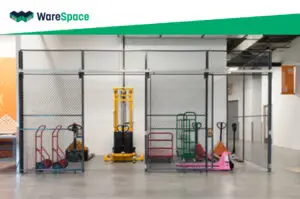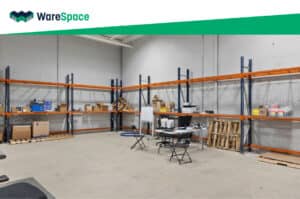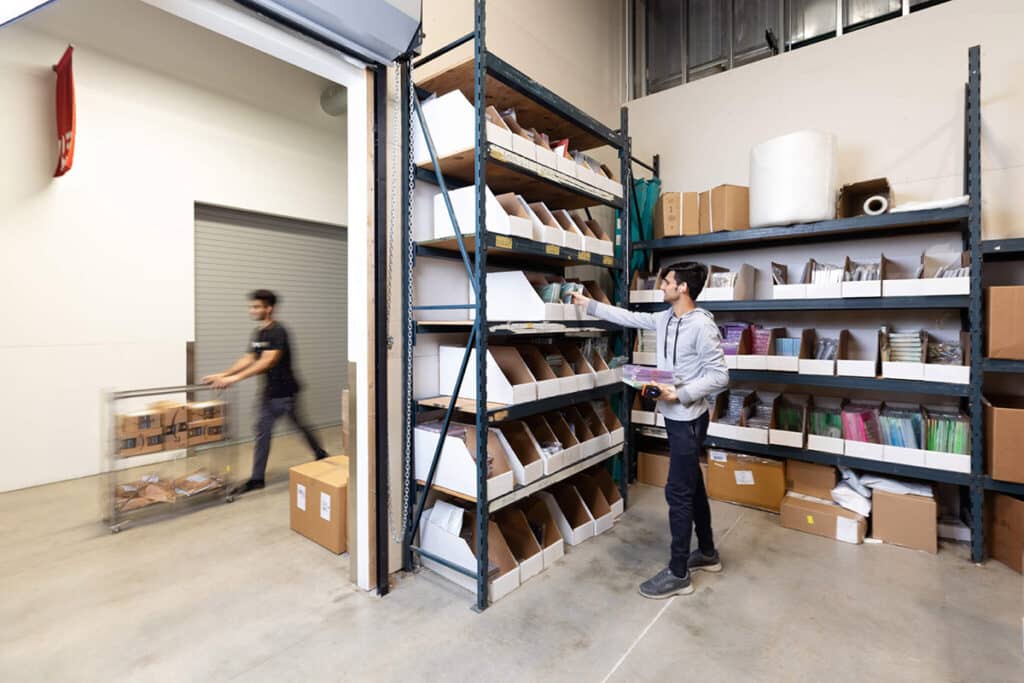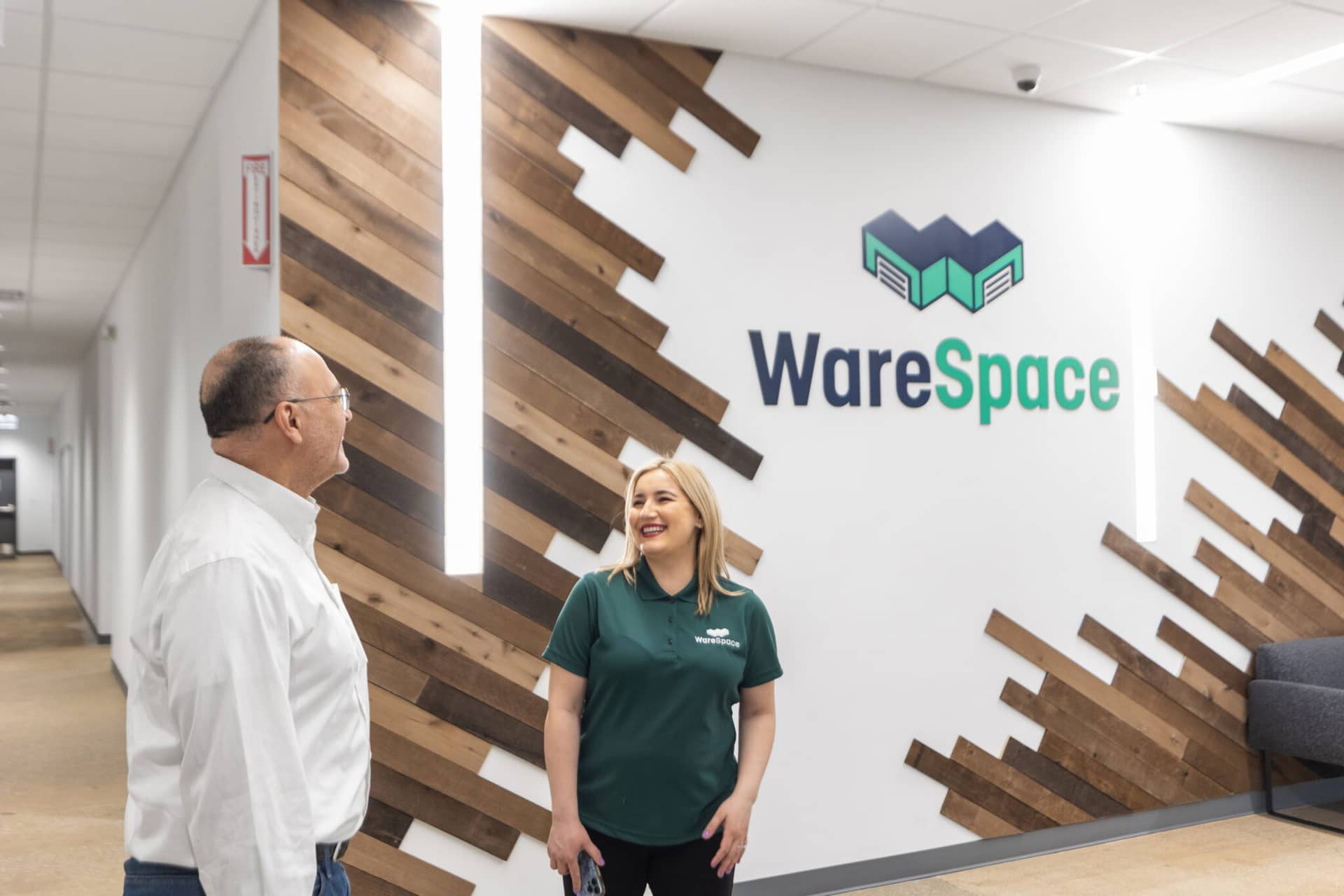Ecommerce sales have been on the rise for the last several years. The pandemic triggered a rapid acceleration in growth among online retailers, with sales in 2020 increasing by 43% compared to 2019. Today, the growth of ecommerce continues. According to the U.S. Census Bureau, as of the third quarter of 2022, ecommerce continued to grow, showing a 10.8% increase from the same quarter of the previous year. Your ecommerce business can grow with the industry, but you must think about how you store your inventory and seriously consider the benefits of having warehouse space for ecommerce companies.
What Is eCommerce Warehousing?
Ecommerce warehousing solutions offer several benefits for online retailers including space needed to store, sort, and ship products they sell online.
Why Moving Your eCommerce Company from a Garage or Living Room to a Small Warehouse Space Is Beneficial
Your home only has so much space available for you to live in and run a business. Reaching your home’s storage capacity, by filling any free space with inventory for your e-commerce business, limits the amount that you can sell. Plus, by having goods in multiple spots around your home, you have a greater chance of losing track of what you have available in your inventory and when you need to reorder products.
Ecommerce warehousing solutions provide the answer for many small businesses needing storage space. Not all businesses need large warehouses. Learn why WareSpace’s small warehouses are perfect for your ecommerce warehousing needs. Our options allow you to select a warehouse space that matches your volume of inventory. When moving from your home and into a warehouse for the first time, you will likely find that a small warehouse space is sufficient for your storage needs. As your business grows, your warehouse space should, too. Scalable warehousing means that you can choose a larger or smaller warehouse space as your business needs change.
In brief, moving from your home into a warehouse provides you with the advantages other businesses have and helps you to compete among other ecommerce retailers.
6 Benefits of Having Warehousing for eCommerce Businesses
When considering whether ecommerce warehousing solutions are right for your business model, consider your budget, time, and supply needs. Also, recognize that you can gain significant advantages by moving your ecommerce business operations and inventory into a small warehouse space.
1. Ship from Locations Closer to Your Customers
If you want to become affiliated with Amazon through its Seller Fulfilled Prime program, you must have the ability to prepare, package, and deliver orders within two days. This strict requirement stems from the company’s overall ability to meet those short deadlines in its own deliveries. For a small business to meet this type of shipping requirement, you should have a facility that can keep your inventory sorted and ready to package and ship at a moment’s notice. Plus, the warehouse location allows you to position it closer to your customers, thus shortening delivery time. Even if you don’t partner with Amazon, you should still work toward reducing delivery times to keep customers happy. One way to do so is by using a warehouse from which to send your products.
2. Keep Your Inventory Secure
Inventory is a major component of your ecommerce business’ budget. In fact, startup companies may spend between 25% and 35% of their operating budget on inventory. With such a deep investment in the goods you sell, you need to keep them secure. Ideally, you should select an ecommerce warehousing facility that offers 24/7 security with video monitoring of the premises and access control of your space. With these control measures, you can have greater peace of mind that your inventory will be available and protected from theft.
3. Reduce Costs
Cost efficiency is a significant benefit of ecommerce warehousing, thanks to the integration of advanced technologies that simplify the complex task of inventory management. This streamlined approach can drastically reduce operational costs, providing several key advantages.
- Streamline Processes: Ecommerce warehousing enables businesses to use their resources more effectively. By leveraging technology for inventory tracking and order processing, companies can allocate their resources—such as goods, manpower, and storage space—more efficiently. This smart allocation reduces unnecessary expenses and maximizes productivity.
- Efficiency: Ecommerce warehouses are designed for efficiency at every step, from storing to shipping. By eliminating wasted space and unnecessary handling, these streamlined processes reduce costs and create a leaner supply chain. This efficiency translates into faster, more reliable deliveries, which can enhance customer satisfaction and loyalty.
- Minimize Waste and Expenses: Effective inventory management and order fulfillment in ecommerce warehousing minimize waste. Precise control over stock levels reduces the risk of overstocking or understocking, leading to significant cost savings and promoting a more sustainable business model. This approach not only cuts expenses but also supports greener operations.
Investing in ecommerce warehousing can lead to substantial cost savings through optimized resource use, minimized waste, and efficient storage and shipping practices. These advantages make ecommerce warehousing a smart choice for businesses looking to enhance their cost efficiency and overall operational effectiveness.
4. Improve Inventory Organization
Homes, garages, and even self-storage units that store inventory for the smallest of new ecommerce businesses don’t offer space to organize or sort products. With a dedicated small warehouse space to organize products, the chance of losing inventory items in clutter drops. An organized warehouse allows for systematic storage, where items are easily accessible and can be efficiently managed. This level of organization not only reduces the risk of misplaced items but also speeds up the order fulfillment process, enhancing overall operational efficiency.
5. Efficient Warehouse Management Tactics
To start using a warehouse management system (WMS), you need to know what you have in your inventory. With an organized ecommerce warehouse storing all your goods, you can more quickly account for all the inventory goods you have. Use this information to facilitate the setup of your WMS, which you can connect to your ecommerce site to further make selling products and buying inventory even easier. Additionally, modern WMS technology can automate various aspects of inventory management, such as real-time tracking, demand forecasting, and reorder alerts, ensuring you always have the right products in stock without overcommitting resources.
6. Increase Inventory in Scalable Spaces
While your home has a limited amount of space, ecommerce warehouse solutions offer a variety of sizes. As your business grows, you can move into a larger warehouse facility with ease. Similarly, if you need to scale back on your inventory, you can switch to a smaller warehouse space. Ecommerce warehousing is designed to be adaptable, allowing for quick adjustments in processes, storage, and logistics to meet changing demands. During periods of growth or seasonal peaks, these warehouses can efficiently manage increased product volumes, ensuring a smooth transition from order placement to delivery without delays. The ability to scale up or down is crucial for handling promotional surges or steady growth, maintaining high standards of efficiency and customer satisfaction.
What Happens If You Don’t Seek eCommerce Warehouse Solutions for Your Business
While ecommerce warehousing offers several advantages for businesses, few online retailers recognize the dangers of not expanding into a small warehouse space. If you keep running your business out of your home, as your retail sales grow, you will face many problems that could impact your bottom line.
1. Hit a Growth Ceiling
Your ecommerce business could hit a growth ceiling. Without storing your inventory in an ecommerce warehouse, you will only be able to grow your business as much as the space in your home allows you to keep your products. Over time, your family members may not like that your business has overtaken the house or garage.
2. Lose Inventory and Money
Another danger of not having a small warehouse space for your ecommerce business is losing money due to poor organization. Not having an organized warehouse for your ecommerce inventory makes losing inventory items more likely. Similarly, reordering products before you need them means that you will have used money and wasted space with excessive products in your home storage.
3. Waste Time
Finally, time and money are intricately linked in the business world, including for small ecommerce businesses. Therefore, anything that wastes time also will cost you money because you will not be able to spend as much of your attention on building customer relationships and improving your business. Wasting time finding inventory items, not knowing what you have on hand, or needing to contact customers because of out-of-stock products all can cost your ecommerce business money.
Your Space Is Ready
Take the chance to expand your ecommerce business by moving your inventory into a small warehouse space. You’ll reap the benefits of a better organized and more secure area for your goods. Why wait any longer to make your move toward greater growth? Your space is ready at WareSpace.




